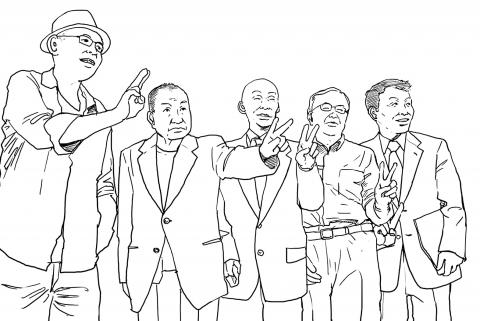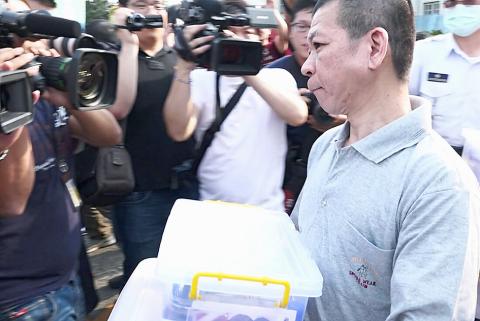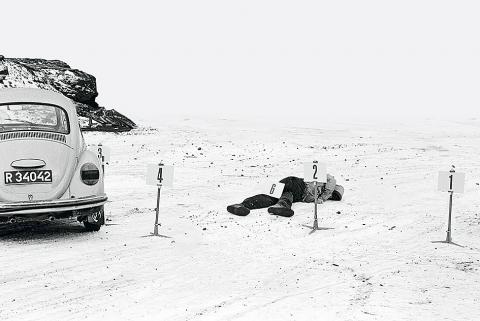In 2002, Cheng Hsing-tse (鄭性澤) was convicted of killing a policeman in a gunfight at a karaoke bar. He was sentenced to death by the Supreme Court in 2006. But a decade later, Cheng walked out a free man after the Taiwan High Court overturned his conviction.
Cheng is one of eight defendants who have been exonerated through the work of the Taiwan Innocence Project (台灣冤獄平反協會, TIP). Inspired by the Innocence Project in the US, the non-government organization was established in 2012 and provides legal assistance to defendants in cases where they have been wrongfully convicted.
Cheng’s story, as well as the plight of other wrongfully convicted individuals and the impact on their loved ones and society are the focus of the first Innocence Film Festival organized by the TIP, which opens tomorrow. Admission is free for all screenings, which will take place at the Spot Huashan Cinema.

Photo courtesy of Taiwan Innocence Project
The theme of “What If” goes back to the pivotal moment when the lives of these defendants changed forever, and invites audiences to consider what the world would be like if the truth is not always as it appears to be.
In Cheng’s case, the TIP identified issues of unlawful interrogation, forced confession and misapplication of forensic science analysis in the original trial. A key detail was the flawed gunshot trajectory analysis used in his trial. After re-examining the evidence, the prosecution filed for retrial, and Cheng was eventually cleared of his crime.
“The judiciary must deeply engrave this in its the soul: how humble people become when they are before you. The way that autumn frost disappears without a sound, that’s also how people are before the judiciary,” writer and activist Chang Chuan-fen (張娟芬) said of the incident, as a reminder of the sacred power of the judiciary. Chang was one of the earliest individuals to start working on Cheng’s case.

Photo courtesy of Taiwan Innocence Project
Documentary Cheng Hsing-tse’s 48 Hours (鄭性澤的48小時) will screen as part of a Taiwan short film selection at 2:30pm on Saturday. Other cases explored in the selection are that of Chen Yen-fei (陳燕飛) in On the Flyway Home (飛燕歸巢), Su Bing-kun (蘇炳坤) in Where Can the Dust Alight (何處惹塵埃) and Lu Chin-kai (呂金鎧), who is still serving out a 20-year prison sentence for rape and murder, in The Sound of Silence (無聲時刻).
Other films look at how wrongful convictions have unfolded around the world. The Central Park Five is an award-winning documentary by US filmmakers Ken Burns, David McMahon and Sarah Burns that follows the fates of four African American and two Hispanic American teenagers convicted for the rape and assault of a white female jogger.
The case became a lightning rod for discussions of racial discrimination in the justice system, and received renewed attention when it became the subject of a Netflix drama series earlier this year.

Photo courtesy of Taiwan Innocence Project
Out of Thin Air looks at the 1974 Guomundur and Geirfinnur case in Iceland, when two manual laborers disappeared under mysterious circumstances. Despite a lack of any bodies, six people were convicted for the murders. Five were acquitted last year.
From Japan, the documentary Gokutomo, or “prison friends,” follows the unlikely friendship that formed between five men, all convicted of murder, who found solace and support in each other throughout their years in prison, despite maintaining their innocence. Promise: The Nabari Poisoned Wine Case, the Life of a Death-row Inmate looks at a death-row prisoner who was still fighting a 1961 conviction for murder when he died in prison in 2015.
While an interest in true crime may be enough to draw audiences in, the films will also invite deeper reflection on how the legal system and society at large carry out justice, and how grace is maintained in the face of injustice.

The entire saga involving the Taiwan People’s Party (TPP) and its Chairman Ko Wen-je (柯文哲) continues to produce plot twists at such a rapid pace that fiction publishers would throw it out for being ridiculously improbable. This past week was particularly bizarre, but surprisingly the press has almost entirely ignored a big story that could have serious national security implications and instead focused on a series of salacious bombshell allegations. Ko is currently being held incommunicado by prosecutors while several criminal investigations are ongoing on allegations of bribery and stealing campaign funds. This last week for reasons unknown Ko completely shaved

Gabriel Gatehouse only got back from Florida a few minutes ago. His wheeled suitcase is still in the hallway of his London home. He was out there covering the US election for Channel 4 News and has had very little sleep, he says, but you’d never guess it from his twinkle-eyed sprightliness. His original plan was to try to get into Donald Trump’s election party at Mar-a-Lago, he tells me as he makes us each an espresso, but his contact told him to forget it; it was full, “and you don’t blag your way in when the guy’s survived two

The self-destructive protest vote in January that put the pro-People’s Republic of China (PRC) side in control of the legislature continues to be a gift that just keeps on giving to the Chinese Nationalist Party (KMT). Last week legislation was introduced by KMT Legislator Weng Hsiao-lin (翁曉玲) that would amend Article 9-3 of the Act Governing Relations Between the People of the Taiwan Area and the Mainland Area (臺灣地區與大陸地區人民關係條例) to permit retired and serving (!) military personnel to participate in “united front” (統戰) activities. Since the purpose of those activities is to promote annexation of Taiwan to the PRC, legislators

Nov. 18 to Nov. 24 Led by a headman named Dika, 16 indigenous Siraya from Sinkan Village, in what is today’s Tainan, traveled to Japan and met with the shogun in the summer of 1627. They reportedly offered sovereignty to the emperor. This greatly alarmed the Dutch, who were allies of the village. They had set up headquarters on land purchased from the Sinkan two years earlier and protected the community from aggressive actions by their more powerful rivals from Mattau Village. The Dutch East India Company (VOC) had been embroiled in a bitter trade dispute with Japan, and they believed